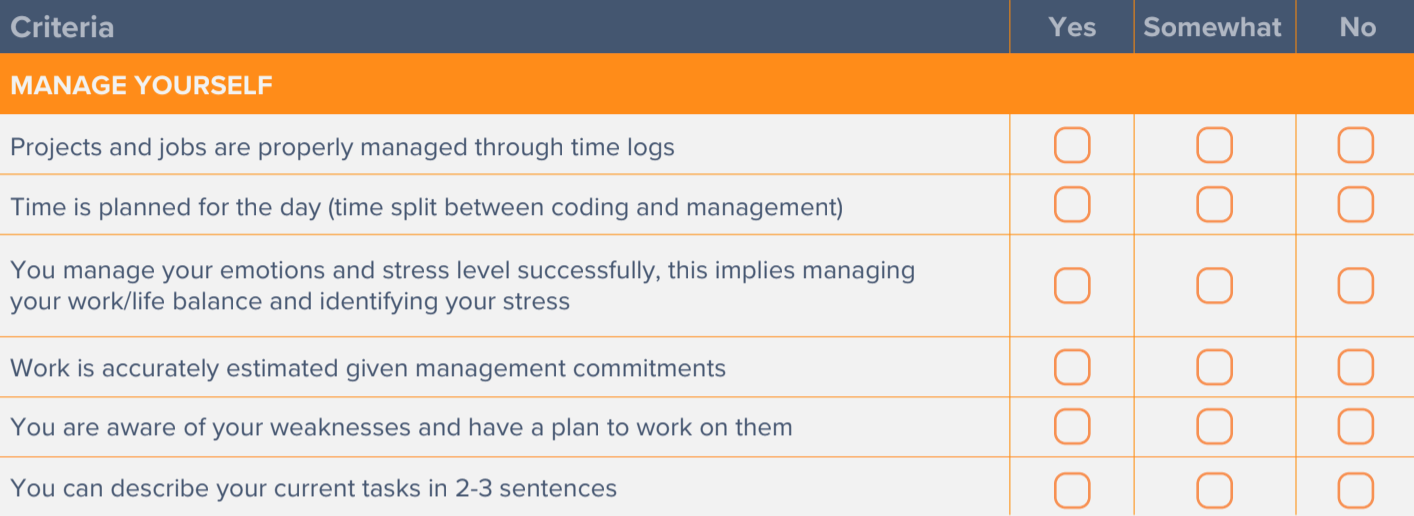In our previous article on Agile Management Philosophy, we outlined three evaluation criteria:
- Manage Yourself
- Manage Your Client
- Manager Your Team
Here we’ll discuss the first step of becoming a manager which is successfully managing yourself. Many developers may think they are managing their own time but in fact they require active management from a team lead to be successful. If you can’t manage yourself, your time, and your deliverables there is no hope of managing a team.

Our agenda for this class includes the following:
- Review and introspection on previous week
- Pillar #1: Ownership
- Best Practices of Self Management
- Emotional IQ & Self Awareness
- Role Playing
Best Practices
Deliverables
Before you can be in charge of managing people, you need to be in control of your own deliverables. Basically, can you do what you say you are going to do. Here are some examples we look out for:
- Are your dev estimates accurate?
- Can you develop your own implementation task list? Is it accurate?
- Are you able to interrogate PMs to get the answers you need to get the work done?
- Do your PRs come back with minimal comments?
Time Management
You also need to be in control of your time. We all only have 24 hours in a day and being able to prioritize and use your time effectively is a crucial skill for any manager:
- Do you have a daily list of tasks/goals that you monitor?
- Do you have a task system that you actually use?
- Do you appropriately balance work and life responsibilities?
- Are you clear on which of your tasks provide the most value to your company or team?
Communication
You’ve got to be a team player and a team player requires that you develop effective communication with your peers, managers, and cross-functional stakeholders.
- Do you know what constitutes a commitment?
- Are you able to compromise?
- Are you able to say No?
- Are you able to ask for help when needed?
Here is some suggested reading to help hone these skills:
- Crucial Conversations by Kerry Patterson, Joseph Grenny, et al
- Principles by Ray Dalio
Emotional IQ: Self Awareness
Emotional IQ: Self Awareness
As we mentioned in the previous article, soft-skills are a critical element of becoming a manager. A good measure of this is emotional IQ (EIQ) and it starts with listening and managing your own emotions. Here are some important EIQ skills for managing yourself:
- Self Awareness - Stress monitoring and coping through meditation, exercise, etc.
- Recognizing your own emotions, use of tools like Mood Meter to identify patterns
- Role playing for developing better listening skills for social awareness and relationship management
- Showing authenticity and demonstrate empathy
Role Playing
The best way to test an understanding of soft skills is to simulate scenarios through role playing. We bring in other managers, developers, and staff to assign roles and work through various examples that test for understanding. Here are some scenarios that evaluate how one manages themself:
- Give an example of your daily scrum update
- You’ve been asked to present a solution to a problem for your team. How do you go about planning and presenting it?
- You’re frustrated with some of the work you’ve been doing. How do you vent?
- Your spouse, partner, or child has been having health issues. How are you managing it?
- Long work hours over the past few months is leaving you stressed. Your boss just dumped another tight deadline on you. How do you handle it?
Scorecard

After you’ve accomplished managing your deliverables, time, and communication, we must turn to the task of managing your client.
Here are links to all posts in this series:


